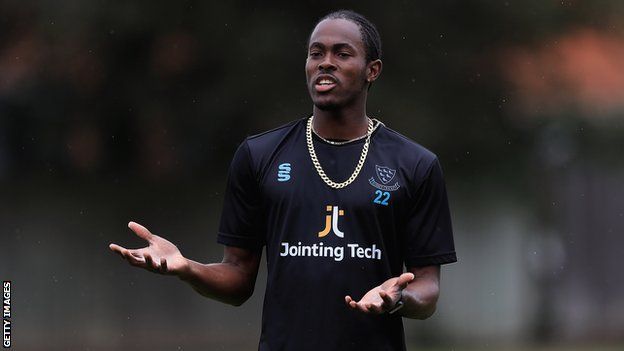Jofra Archer could play for England next year after ECB changes residency rules
- Published

Archer played for Sussex in the T20 Blast final where they lost to Worcestershire
Some overseas cricketers will be eligible to play for England after living in the country for three years under new rules coming in on 1 January.
The updated England and Wales Cricket Board rules mean, for example, that Sussex all-rounder Jofra Archer will be eligible to play for England next year.
Archer was born in Barbados but has an English father and a British passport.
Under the previous rules he would not have been eligible until the winter of 2022 after a seven-year residency.
That, since 2012, had been the period required for players who arrived in England after their 18th birthday.
However, 23-year-old Archer, who was signed for £800,000 in the Indian Premier League auction last January, could now be included in England's World Cup squad next summer.
England tour the West Indies next year, with three Tests from 23 January-13 February followed by five one-day internationals from 20 February-2 March and three Twenty20 internationals between 5-10 March.
Three of those matches are in Barbados, and Archer wrote on Twitter:, external "It may or may not happen but I would love to debut in front of my family."
But on Thursday, Sussex said Archer is likely to qualify "at some point in March 2019."
The county explained in a statement that the exact date of his qualification would depend on the time he spends out of the UK during the rest of 2018-19.
Were Archer to miss the West Indies tour, there would only be six England one-day internationals - one in Ireland and five against Pakistan - before the World Cup begins in May.
From 1 January 2019, to play for England, players will need to:
Have British citizenship and
Either have been born in England/Wales, or have three years' residence (a total of 210 days/year April-March) and
Not have played as a local player in professional international or domestic cricket in a full member country within the past three years.
The changes bring the ECB closer to International Cricket Council regulations.